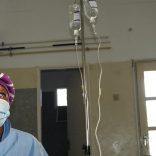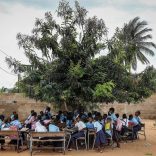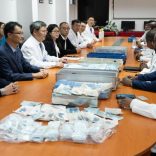Mozambique: Maria de Lurdes Mutola calls for commitment to girls and women in sports - Watch
UNU Wider says Frelimo must save itself – and Mozambique | By Joseph Hanlon

File photo: Twitter / @InclusiveMoz
UNU-Wider: Frelimo must save itself, and Mozambique
“It is fundamental to recognise that political power and authority in Mozambique continue to be almost exclusively vested in Frelimo. … It takes visionary and brave leaders with strong economic backing to take on the necessary reforms to put Mozambique back on a favourable institutional and socioeconomic trend,” says UNU-Wider in its new study Mozambique at a Fork in the Roads. “Existing poverty, inequality and lack of inclusion will generate frustration, which must be addressed rather than suppressed. The events in Cabo Delgado are a wake-up call.”
The study confirms that a small Frelimo elite have created what is called a “limited access” society, in which a small party group controls the state and used this to become dominant in business, and retains power through its control of institutions such as the judiciary and elections commission. And it warns that “elite rivalry in Frelimo is not enough to create meaningful change. Only a few groups benefit from the connection between political and business interests.”
The study is equally critical of the donors and the imposition of neo-liberalism.
It is essential to develop “a unifying vision for a growth strategy centred on agriculture and agro- industry, labour-intensive private sector dynamics and natural resources [which] has been lacking for decades,” concludes the study. “Moreover, reforms in the national health system, the promotion of systematic quality standards on education and the expansion of social protection will be essential to help guarantee a more inclusive Mozambican society. This diagnostic points additionally to the need to level the playing field in terms of political competition … as well as to ensure the separation between the executive, judicial and legislative powers.”
This study is the best analysis of Mozambique today, and carries weight. The United Nations University World Institute for Development Economics Research (UNU-WIDER) in Helsinki has been doing serious research on Mozambique for 15 years. This study was started last year with the support of the Mozambican Ministry of Economic and Finance and is led by Finn Tarp, Wider director 2009-19: Antonio Cruz, former national director of planning; and former Danish ambassador Johnny Flento. Contributors include former ministers, a former supreme court judge, and eminent Mozambican researchers.
The draft report Mozambique at a Fork in the Road – an Institutional Diagnostic was launched at a conference on 4 November and is available to download, in chapters and in English and Portuguese, on https://bit.ly/Wider-Inst. For a quick summary, read chapter 13, synthesis and recommendations.
New UNU-WIDER working paper out on economic complexity and structural transformation in #Mozambique https://t.co/avV5RqutLE
— John Rand (@JRdk22) November 4, 2020
The following articles are highlights from the report on specific issues.
‘No separation between party, state and business’
“There is no effective separation between party and state and big business,” concludes the study. (Chapter 13) ” Mozambique is not a case of capture of government by a business elite, but of capture of business by the political elite. …Big business in Mozambique is organised by politicians in a powerful structure where business owners cannot hedge their bets and finance the campaigns of various political parties (as seen in some former Eastern European countries and Russia). If Frelimo loses elections, it is likely to be ‘game over’ for many of Mozambique’s business owners and entrepreneurs in an environment where politics and business are closely intertwined. Everyone knows that their best and maybe only bet to stay in power and continue to harvest rent is to protect the party’s interests. Thus, the business owners oil the party machine. … Conflict of interest at best, and more often corruption, is embedded within the system..” (ch 13)
Toward the end of the 1981-92 war, the World Bank and IMF imposed a structural adjustment programme on Mozambique that required rapid privatisation of more than 4,000 companies. “Renamo associates were in no position to benefit, as they were still fighting in the bush when assets and opportunities were privatised. Frelimo also treated them with suspicion, and they have since found it very difficult to establish themselves in the evolving legal and economic environment. What this means is that political and economic power merged in the hands of the former socialist Frelimo elite. … The lack of effective separation of state and party that had existed under Frelimo’s one-party rule remained in place. Moreover, this opened up possibilities for rent-seeking and elite capture. … Extensive links between the holders of political office (also the most educated cohort) and owners of private firms is now embedded in Mozambique. One consequence is the almost complete absence of an independent non-political capitalist class.” (ch 13)
“Mozambique’s first post-independence private entrepreneurs were overwhelmingly government officials and public servants who acquired public assets (sometimes at very low prices) in the privatisation drive in the late eighties and early nineties. Since there were practically no private businesses in Mozambique during the socialist area, the new entrepreneurial class had to be recruited from public institutions, including the security forces and the government itself. … The oligarchs had only limited experience to begin with.” (Ch 13)
“Frelimo privatised the assets and, more importantly, the business opportunities to its own members. Some of the new Mozambican businesspeople had technical knowledge, but they rarely had the skills and mindset of an entrepreneur. Most were started off in private business with a public asset including some sort of exclusivity (licence, quota, geographic position, or contract for supplies to government) and continued to depend on government protection of their monopolistic position.” (ch 13)
“While the merging of the political and economic powers has clearly undermined market competition, competition among different groups within Frelimo remains, as reflected in the challenging transition from President Guebuza to President Nyusi, who was not Guebuza’s preferred candidate.” Issues between Frelimo businesspeople are settled in relation to their political strength. There are “delays and destruction of projects that elite infighting and rent-seeking cause to programmes and projects financed by donors and foreign direct investment (FDI). When elements from different factions of the elite (Frelimo) are poisoning and stealing each other’s projects (rent-seeking or not), this helps to create corrupt or ‘do nothing’ overcautious behaviour in vital institutions prioritizing, coordinating, and approving vital investments for economic growth.” (ch 13)
“Foreign investors and interests, especially in the natural resources sector, are well connected and use their leverage to shape the rules in their favour. Foreign players need the endorsement and help of national elites for their establishment in the country” (ch 3)
Elite capture
The Wider report repeatedly points to the problems caused by power and control being in the hands of an elite which is largely based in Maputo and which has lost contact with the bulk of the population far away in the north of the county. “A child in Cabo Delgado province is around three times more likely to die before the age of five than a child in Maputo City.” (ch 7)
“Mozambican society is a profoundly unequal society, divided between a privileged minority that holds the reins of political and economic power and ‘the others’, i.e. a vast majority of poor, disadvantaged and marginalized citizens, who have little capacity of controlling the actions of the political leaders and very little influence on the determination of the fate of the country,” warns former Health Minister Ivo Garrido. (ch 7)
In his chapter, former health minister Ivo Garrido argues “that the deficiencies and inefficiencies of the operation of the health sector in Mozambique are largely the result of the fact that the institutions with influence on the health sector are controlled by a minority of privileged people who do not give the appropriate priority to the basic health needs of the majority of the population.” This is why the “health budget favours allocations to central and provincial bodies to the detriment of district bodies, where primary health care takes place [and spending is] mainly on curative actions to the detriment of health promotion and disease prevention actions.”(ch 7) Garrido speaks from experience as he has been co-owner of the private Clinica 222 for two decades, including when he was health minister. He notes that “due to the widespread poverty, the private medicine sector covers only 5% of the population.” He adds that “all but one of the central and provincial hospitals have special clinics, special consultations, and private rooms that are off limits to anybody who cannot pay the prices stipulated.”
There is a “lack of political will of the political leaders to put the satisfaction of health care needs in the poorer segments in first place. … The privileged minority groups in society … relegated the public health sector to second place, largely because their own health care needs are met by going to organisations (such as hospitals, clinics, rehabilitation centres, etc.) abroad or, when this is not possible, the national private sector.” (ch 7)
In agriculture, “this de-linking of the urban middle class from its own agriculture is a fundamental problem for inclusive development in Mozambique, and it is a growing one. … The urban population is not buying and eating what the farmers produce. Moreover, the wheat import and milling industry allows for rent-seeking because it is a profitable business depending on licences and administered prices.” (ch13)
Agriculture always a low priority
“The peasantry and the development of agriculture and the rural sector have over the years remained de facto a low priority in development efforts, and that much-needed productivity growth has been both slow and unsatisfactory.” (ch 13) “While the government regularly announces formal pro-poor development strategies and plans, implementation is lacking. This is so in the agriculture sector, in particular.” (ch 1) “Agriculture’s progress in the 1990s seemed due, in large measure, to the return of refugees. Subsequently, Frelimo has failed to implement the measures necessary for agricultural development.” (ch 2) “The level of productivity in the main food crops has changed little in the past 50 years. The income of smallholder producers remains at subsistence level. Poverty levels are higher in rural than in urban areas. The dominant technology is still manual.” (ch 3)
Since 2008, per capital food production and productivity have been decreasing and food imports are increasing. “Food production in Mozambique is not sufficient to feed the population. … Between 2010 and 2017, per capita production of some foodstuffs, such as cereals, fell to almost half. At national level, the yield per hectare of food crops also declined.” (ch 4) Investment in agriculture is decreasing.
“In terms of family farmers, agricultural productivity in Mozambique is one of the lowest in Southern Africa and possibly in the world. Of the 3.8 million rural families (informal farmers) only 5% use fertilizer and/or improved seeds. These families will not be able to escape the poverty trap resulting from extremely low productivity. They need an external jolt in the form of access to resources, including credit and modern technology. Rural families cannot run the risk of introducing new crops unknown to them, abandoning, if only partially, the previous ones, accompanied or not by new technology, because if they fail, and in the absence of savings and financial support, they are putting the physical survival of every member of the family at risk. The risk is enormous, so it comes as no surprise that country people are conservative,” warns former Finance Minister Magid Osman. (ch 5) “The evolution from family farmer to a small commercial company is, on the other hand, an indispensable historic leap, but a difficult one. This is because in a world where developed countries provide massive support to their agricultural SMEs, distorting the world price system, this historic evolution will only be possible under a framework of systemic support, including financial support.”
After the war “World Bank and IMF policies prevented the government from defining public policies in support of agricultural production. The argument was that there was a need for reducing the public deficit. As an alternative, there were ad hoc projects like the Mozambique-Nordic Agriculture Programme and donor-funded programmes like ProAgri that were not sustainable and missed the purpose of supporting smallholder producers.” (ch 3)
“The proportion of credit to agriculture over total credit to the economy went from around 18% in 2001 to around 3.5% in 2017, 60% of which was aimed at sugar, cotton, cashew, tea and copra, as well as at livestock and forestry.” “The basic services for plant and animal health, agricultural research and extension, statistics, supervision and quality control, protection and development of genetic material, enforcing the law and resolving market distortions have lost their priority in relation to localised and occasional private interests.” (ch 4)
“The agriculture sector provides an example of the influence of donors. Agriculture is decisive for Mozambique’s growth, and donors have competed for influence in policy development. Numerous new subsector strategies were developed, and policies changed over time and according to which donor formation was the most influential. … One of the most disastrous pieces of advice from donors was to privatize the country’s well-functioning and solid seed institute. Foreign investors bought it, and soon after, it closed, leaving many farmers to use open pollinated varieties of low yield.” (ch 13)
João Carrilho and Rui Ribeiro (ch 4) ask: “will it be possible to promote the development of Mozambican agriculture in the next 10-20 years in an essentially liberal economic policy framework, or will specific economic policies be needed to stimulate this development? … To propel endogenous agricultural development that is socially inclusive and sustained, Mozambique will need to adopt suitable credit policies to stimulate investment in the intensification of agricultural production, subsidies aimed at promoting an increase in productivity, price and market policies that reduce the risk of negative impacts in the production sector caused by fluctuations and market downturns, and customs regulations that do not expose national farmers to very unequal competition from agricultural products whose export is promoted by their countries of origin through a variety of incentives.”
Last session of a great #IGMconf2020 @InclusiveMoz pic.twitter.com/RqNNWCszjd
— eva-maria egger (@EvaEggerPhD) November 6, 2020
Structural adjustment is still with us
The 1987 “structural adjustment programme [SAP] (reflecting a standard package of orthodox policy reforms that took no account of local circumstances) was ill conceived for a country at war … and the short-, medium-, and longer-term economic effects were dire. No supply response from agriculture was possible due to the overwhelming effects of the war; and subsidised industries in the cities had to lay off workers, adjust wages, and eventually expect privatisation or closure.” (ch 2) SAP was based on “letting the market mechanism allocate resources without developing relevant market system institutions such as training, information systems, and competitive financial institutions.” (ch 9)
Mozambique had to “adopt new economic policies in exchange for aid and debt relief. Those policies were standard recipes for former socialist regimes joining the Bretton Woods institutions. They made Mozambique pursue fiscal austerity, market-based reforms, and privatisations in a wartime environment where the economy was incapable of responding to market incentives.” (ch 13)
“The traditions and approach of the Bretton Woods institutions did not make things better. The imposition, especially by the World Bank, of new working methods and the support of hordes of foreign consultants often led to weakening national institutions, turning them into rubber-stamping entities. The SAP itself caused public sector salaries to shrink significantly, often below the subsistence budget level for a family.” (ch 11)
“A laissez faire approach will not unleash the productive potential of the [agriculture] sector. What is required instead is a comprehensive and consistent set of public sector interventions and support to address the many externalities and co-ordination issues associated with agricultural production and transformation.” (Ch 13)
Although the IMF and donors say structural adjustment and neo-liberalism do not exist any more, the message has not reached Mozambique. Former Finance Minister Abdul Magid Osman and Djamila Pontes Osman, both senior in the Mozambican investment company Epsilon and thus very much part of the Frelimo business elite, argue that “the neoliberal doctrine of the economic sphere has become deeply rooted in governing spheres” which thinks they must use “market forces for the solution to serious social problems in the country.” They continue: “Even before the economic crisis in 2015-16 (caused by the fall in external support as a result of the revelation of illegally contracted debts), the government was ‘forbidden’ from engaging in support policies for national industry, subsidising interest rates, [and] promoting housing policies. … Now, as in the past, it is unthinkable to have subsidised interest rates.” Donors are allowed to subsidise interest rates for specific projects, like solar energy. (ch 5)
“The key challenge is how to get the financial system to extend financial services to the so far largely excluded (rural) poor and micro and small enterprises (MSEs) with a view to helping to unlock their growth potential. … The very high rates of overall bank profitability reflect the fact that banks avoid the risky business associated with serving the poor (and MSEs)”. The Bank of Mozambique “is not pro-poor”. (ch13)
How donors, SAP and the ‘internal brain drain’ smashed health and education
“The introduction of the fast track [teacher training] model is an example of how decisions on educational policy based almost exclusively on assumptions of a financial or economic nature can have devastating consequences for the quality of education of one or more generations, if not the entire nation.” Teacher training had been that after 10 years of schooling, would-be teachers were given 3 years of primary teacher training. “Some important international partners put pressure on the ministry in order to reduce the number of years for primary teacher training from three to just one” because the salary of the teacher would be significantly less. “The net effect of this alteration was a proliferation of primary school teachers without the necessary skills to teach.” One year of training was “shown to be totally incapable of providing primary teachers with the skills required in the areas of reading, writing and arithmetic and preparing them for dealing with very large classes.” In Zambezia, Nampula, and Cabo Delgado provinces there are over 70 pupils per teacher. (ch 6)
“Health policy is defined more by the international community (the cooperation partners or donors) than by the Government of Mozambique. This is the case because the international community a) makes the largest financial contribution to the health budget; and b) it orders and funds the ‘consultations’ where the diagnosis of the health sector is made and where health policy proposals are presented. It is based on these ‘consultations’ ordered and paid for by the international community that the Government of Mozambique is pressured into prioritising selected strategies, programmes and activities ‘proposed’ by the donors.” (ch 7)
“Macroeconomic policies imposed on Mozambique by the World Bank and by the International Monetary Fund imply restrictions to the contracting of human resources for the health and education sectors by the government. This is why, over the last 15 years, the government has been unable even to hire and employ all of the doctors, nurses and other health workers trained in Mozambique.” (ch 7)
“Almost all of the cooperation partners decided to channel the largest slice of their financial resources not into the National Health Service (which provides health care to over 90% of the population), but rather to NGOs and other partners dedicated to the so-called vertical programmes for fighting diseases. These vertical programmes, dedicated at the most to three diseases or a specific segment of the population (such as mother and child health), and with bottom-up dynamics, contribute to the weakening of the public health sector due to the duplication of efforts, the distortion of national health plans, the ‘theft’ of scarce human resources and the chronic underfinancing of the National Health Service.” (ch 7)
The shortage of health workers “is aggravated by health workers (especially those more qualified and/or more experienced) leaving the National Health Service to go to work at embassies, NGOs, cooperation partner agents based in Maputo and the private for-profit sector. The main reason for this, but not the only one, is that these organisations pay higher salaries than the government. This is called an ‘internal brain drain’, as opposed to the brain drain out of Mozambique. In Mozambique, the internal brain drain is at least three times higher than the brain drain out of the country. In other words, recruitment practices by the donor community in Mozambique undermine and weaken the National Health Service that this community claims it wants to strengthen.” (ch 7)
“It should be pointed out that the majority of the reforms and strategies proposed for the health sector by the so-called cooperation partners are unrealistic given the poor economic capacity of the country and because the cooperation partners are not willing to fund the policies they themselves advocate as the most correct for Mozambique.” (ch 7)
Civil service absent and corrupt
“Absenteeism is high, and many public servants are chasing fringe benefits like travel allowances and are involved in other economic activities in the private sector. At the decentralised level, the special double role of the district administrators (as politicians as well as technical supervisors and co-ordinators) is challenging technical professionalism.” (ch 13)
“The Constitution gives the president extensive powers of appointment, with a systemic trickle- down effect in the justice sector. Strong affiliation with the dominant party is decisive for the careers and livelihood for judges, sometimes as much as their professional ability and integrity.”
“Corruption has been sharply on the increase in Mozambique since the mid-1980s. This institutional weakness relates not only to political grand corruption, illustrated by the case of the hidden debt scandal. It also includes cases of petty corruption and embezzlement of public funds. Cases of Frelimo members, their families, and highly positioned civil servants who happen to receive commissions in the economic deals involving public entities, obtain privileged access to land use rights, and provide politically motivated cheap electricity to urban families illustrate this.” (ch 13)
“The health sector is among those considered most corrupt.” Selection for contracts for construction, medicines, etc is often “based on party political affiliation, nepotism, friendships, ethnic identity and even the provision of sexual favours,” according to former Health Minister Ivo Garrido. Contracting “is very often done on the fringes of the law [resulting in] poor quality buildings, the acquisition of medical supplies and equipment of inferior quality and the unlawful siphoning of money to dishonest businesspeople.” (ch 7)
“The state apparatus serves the purposes of offering jobs to acquaintances, family members, and ‘comrades’ and of creating a politically loyal group. The consequence is an ineffective and expensive state that fails to meet the need to provide public services to the population.” (ch 13)
Managing donors, not development
“The unstable and multifaceted relationship with donors has been at the core of the volatile development path of Mozambique since its independence.” (ch 1) Government learned how to manage donors and aid, but never learned how to develop the country, former Foreign Minister Leonardo Simao said in his presentation of his chapter on 4 Nov.
“What matters is how recipient countries deal with donor-driven reforms they are unable or unwilling to implement. One approach is to make believe, or to pretend, all is going well – a feature that is characteristic of Mozambique! In many other cases, the proposed systems may be necessary and appropriate for the recipient country, but they are seldom given enough time to mature or to be fully assimilated and implemented due to budgetary considerations, changes of government and relevant officials, or policies in the donor or recipient country,” say Simao and former ambassador Johnny Flento. Donors introduced indicators, such as “how many children were enrolled in primary school and how many legal cases were awaiting settlement in the courts. It said little about learning outcomes and access to justice in Mozambique.” It encouraged pretending, “because meeting output indicators became the objective.” But it increased aid because meaningless targets were met. (ch 11)
“Decisions reflect conditionality from these partners, including over-ambitious policies and targets. Additionally, even if external donors provide financial support in terms of creating infrastructure, they do not finance a significant part of maintenance and other recurrent costs, including salaries, which account for the lion’s share of the budget.” (ch 13)
“Donor dependence entails instability, as donors’ objectives and modus operandi change over time and provoke different conditionality for aid finance. Most donor agencies are fronted by diplomats, who know that aid effectiveness ranges below security and commerce in the foreign policy hierarchy. Even on their own terms, aid agencies can be rather paternalistic and compete for influence over policy formulation.” (ch 13)
Former minister Simao and former ambassador Flento point out that “almost all the successful cooperation programmes that have delivered good results are likely to have been initiated by the predecessors of current development ministers who are often from a different political party. … No development minister dreams of extending … a support programme … approved by a predecessor from a different political party. As a result, there was constant pressure on the GoM to adopt and implement new reforms designed by donor-financed consultants in the image of donor countries themselves.” (ch 11)
The 2015 secret debt crisis and its cuts in aid largely ended the old regime. The cuts were intended to punish the greedy Frelimo elite but only punished the poor. “Frelimo is still in government and has probably strengthened its position as compared to 2016 [and] donors are coming back on stream” – IMF, EU, USA. “Most bilateral donors will follow,” although with less aid. (ch 11)
“Aid budgets are under pressure and development finance has become much more linked to other donor-country foreign policy concerns, especially those related to security and commerce [and away from] poverty alleviation, human rights, and democracy. … . This has changed donor yard-sticks and their modus operandi. This is a challenge because the aid architecture and institutions Mozambique developed to deal with donors are not well suited for these new challenges.” (ch 13)
Education – ‘schooling without learning’
“The impressive increase in school attendance rates has not been accompanied by a corresponding improvement in the quality of learning”, and the quality of education is deteriorating. Over half of pupils do not complete primary education. This is “schooling without learning.” (ch 6)
“The state’s poor administration capacity is also plainly seen in the almost non-existent control over teacher attendance and effectiveness.” The absenteeism rate for both teachers and school principals is 45%. This is partly due to the politicisation of the selection and promotion of school principals and local and district management. There is a school council system which involves parents, but members are often selected by the principals rather than the community and parents are reluctant to criticise teachers, fearing reprisals against their children. (ch 6)
“Social spending per capita is comparable to that of neighbouring countries, but outcomes in Mozambique are inferior. … While more than 90% of children attend primary school, the primary school completion rate is only around 40% versus 80% in neighbouring Tanzania; and under 5 mortality is 74.2 per 1,000 live births versus 53.0 in Tanzania.” (ch 2) “Geographically uneven investments in public services have contributed to increasing inequality between the regions of the country.” (ch 13)
“There is a need to promote systematic quality standards in education, both for teachers and for students. Education practices should be separated from political interests. … Education must focus on fields that the Mozambican economy requires – for example, agronomy, fisheries, and tourism, and new areas in science and technology.” (ch 13)
UNU-Wider Proposals – Agriculture & agro-industry must take centre stage
“The Mozambican economy remains fragmented and highly dependent on external resources. This vicious circle must be broken.” (ch 13) “Agriculture and agro-industry must take centre stage. This is central to address existing poverty and is the only way to tackle fragmentation and spatial inequality and ultimately conflict. … Moreover, such an approach is associated with the added bonus that should gas disappoint – with weak revenues once it comes on stream because the global energy transition to renewables moves fast or a glut of gas develops – then a more dynamic agriculture has been built.
“This will require developing a unifying vision for a growth strategy centred on agriculture and agro- industry, labour-intensive private sector dynamics and natural resources. Moreover, reforms in the national health system, the promotion of systematic quality standards on education and the expansion of social protection will be essential to help guarantee a more inclusive Mozambican society. This diagnostic points additionally to the need to level the playing field in terms of political competition … as well as to ensure the separation between the executive, judicial and legislative powers.” (ch 1)
A key proposal is to create an agricultural bank or fund that would provide credit only to smallholders and SMEs in the agricultural sector, at below market interest rates and lowering risk for farmers to allow them to expand. This would be linked to a National Guarantee Fund, similar to the export credit guarantee funds, but to support agriculture lending. (ch 5, 13)
“Industrial policy would have to focus on developing competitive labour-intensive companies that would be upgraded from low to high value-added products” including transformation of products such as fruit and vegetables. (ch 13)
“The current passive approach to the extraction of natural resources is a dead end. What is required is a deliberate supply-side policy aimed at using the natural resources industry as an important opportunity to support agriculture and business sector growth.” (ch 13)
“Lack of transparency has wide-ranging implications for how Mozambican society operates. It opens up possibilities for corruption and misuse of public funds. A first set of reforms would include effective monitoring and enforcement of public probity and conflict of interest legislation, including public registries of the wealth of members of parliament and senior government officials. … Moreover, massively heightened transparency around all forms of government contracts and beneficiaries must be enforced.” (ch 13)
Thank you to all for attending the presentation of the draft report of the #IEDIMoz! Thanks to all participants and our @InclusiveMoz partners, UNU-WIDER @DERG_DK @OPMGlobal and @FCDO_Growth for making the #EDIMoz possible! Full report at: https://t.co/BrCYlZKm3Y pic.twitter.com/0pgjqoF3cO
— IGMozambique (@InclusiveMoz) November 4, 2020
The fork in the road – Chile or Angola?
“Mozambique is … about to experience a shift from development aid to FDI in the extractives sector as the prime mover of growth. This shift presents risks, and so far the large inflows of FDI into the extractive industries have not created many linkages to the rest of the economy. … It may replace one kind of (donor) dependency with another, potentially more risky dependency on the export of a few commodities and a handful of large foreign companies. … However, this shift also presents an opportunity; natural resources will bring revenues that can be used to pursue inclusive development, as evidenced by cases of success in natural resource management (e.g. Chile, Malaysia, or Indonesia). The fork in the road is between pursuing this trajectory or continuing on the current path along an Angola-style scenario. It is vital that the natural resource boom does not deepen and aggravate the existing lack of linkages between the urban and rural sectors in Mozambique. At present, foreign savings are not benefiting the rural economy and livelihoods but are largely used for large-scale investment or siphoned off in imported consumption by the elite and middle class overwhelmingly living in southern Mozambique. ” (ch 13)
“As the current strategy based on natural resources seems to be failing, we suggest an alternative balanced growth strategy in the context of an effective democratic political system [with] the identification of policy priorities required for fostering sustainable and inclusive development.” (ch 9)
Frelimo’s continuing inability to promote agriculture and broad-based private sector growth help to explain why Mozambique remains close to the bottom of the scale in terms of GDP and human development, in a context where rent-seeking is on the rise and the polarisation between Frelimo and Renamo remains tense. (ch 13)
“The notion of entitlement came from the fact that Frelimo had led the struggle for independence from colonial rule and made Mozambique a sovereign country. … The sentiment of entitlement remains very strong in Frelimo, where many continue to equate sovereignty with the party’s grip on power.” (ch 13)
By Joseph Hanlon












Leave a Reply
Be the First to Comment!
You must be logged in to post a comment.
You must be logged in to post a comment.